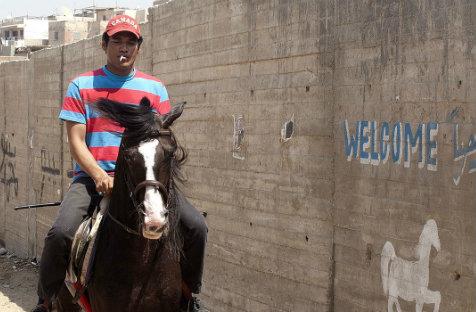In the aftermath of revolution, it is the political repercussions that attract attention, as governments fall, leaders are deposed, and the people earn their say. While After the Battle (Baad el Mawkeaa) grounds its narrative in an act of demonstration and the ideological alteration it sparks, it is the personal ramifications of such events that the film truly ponders: the impact upon ordinary individuals left to cope in democracy’s wake.
In his ninth feature, writer/director Yousry Nasrallah (18 Days) combines with first-time co-scribe Omar Shama to straddle both sides of the Egyptian conflict, setting the film in the months that follow the famed ‘Battle of the Camel’ at Tahrir Square in February 2011. Through the plights of his protagonists – city-dwelling advertising executive Reem (Menna Shalabi, Microphone), and Nazlet horseman Mahmoud (Bassem Samra, 678) – Nasrallah explores the daily reality that immerses not only the reformers but also their resistant adversaries in the post-conflict chaos, with change, equality and stability promised, but uncertainty, violence and prejudice prevalent.
Reem and Mahmoud cross paths during an act of humiliation, the latter publically denigrated for his involvement in the fray as the former unwittingly watches on. Her sympathies go out to him, as the proud man is refused fodder for his prized horse, argues with his unhappy wife (Nahed El Sebaï, Scheherazade Tell Me a Story), and sees his sons (debutants Abdallah Medhat and Momen Medhat) taunted for their father’s actions. Reem’s presence raises suspicion – about her intentions, his nature and the truth of their unlikely relationship. The more she tries to understand Mahmoud’s fight to retain his modest livelihood in a country that is moving on without him, the more precarious their respective situations become.
That nothing is simple is a testament to Nasrallah’s understanding of the complicated circumstances that surround the characters and their real-life counterparts. Class conflict, economic imbalance and the expected dichotomies of men and women, modernity and tradition, comfort and poverty, and desire and duty inform a story that veers into melodrama but always remains anchored in reality. The actors prove an asset in conveying such complexity, even as their dialogue becomes overly verbose. An agenda is evident in every plot machination, but so is thoughtfulness in telling the topical tale.
Yet, the problems of mixing fiction with the facts so soon after the event plague the film, despite the authentic background such timeliness affords. Amidst the energetic imagery of cinematographer Samir Bahzan (Justified Betrayal), an overabundance of ideas, angles and anger jostle for supremacy, with none satisfactorily explored. Accordingly, After the Battle offers another example of contrasts: of ambition and execution. The powerful ending epitomises the divide, lingering in memory much longer than the well-intentioned content that precedes it.
Rating: 3 stars out of 5
After the Battle (Baad el Mawkeaa)
Director: Yousry Nasrallah
France / Egypt, 2012, 116 mins
Arab Film Festival
http://arabfilmfestival.com.au/
Sydney: 27 – 30 June
Canberra: 4 – 7 July
Melbourne: 12 – 14 July
Actors:
Director:
Format:
Country:
Release:





